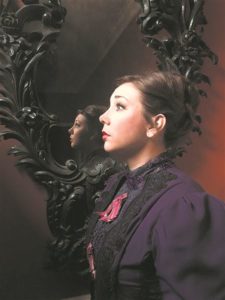The final installment in Toledo Opera’s “Season of Three Barbers” opens this week with Samuel Barber’s Vanessa, one of the darkest operas ever written.
Awarded the Pulitzer Prize in 1958 after an unqualified success at the Metropolitan Opera in New York, Vanessa marks the third year of Toledo Opera’s commitment to staging works by contemporary American composers.
Barber is a dark horse among the canon of recognized 20th century writers. Though not vast, his output has had a remarkable effect on American classical music. His celebrated works include the overture for the School for Scandal, the Essays for Orchestra, and the nostalgic American vocal portrait Knoxville Summer of 1915, to name a few. He is probably best known, however, for his Adagio for Strings, which came to national attention when it was played at the funeral of President John F. Kennedy.
Vanessa is a haunted work, filled with music that demands absolute focus and concentration by all involved: the singers on stage, the orchestra in the pit, and the conductor who must navigate the metrically shifting, complex score. The libretto was written by another American composer, Gian Carlo Menotti, a giant of modern opera composition in his own right.
Intimate in scope, the opera features a cast of only seven characters: Vanessa, Erika (her niece), the Baroness (Vanessa’s mother), Anatol (the son of Vanessa’s former lover), and three others (the Doctor, Nicholas the majordomo, and the Footman).
The Baroness and Vanessa have lived together for years without speaking in Vanessa’s country house, where every mirror is covered and the curtains are always drawn. Vanessa awaits the return of Anatol, her former lover and the apparent reason for the estrangement between the mother and daughter.
Anatol arrives only to reveal to the niece Erika that he is actually the son of Vanessa’s ex-love. He proceeds to seduce Erika, then woo a now close-to-deranged Vanessa. When Erika realizes she is pregnant, she attempts to end the life of the child she carries.
Vanessa flees with Anatol, and Erika is left to face the Baroness alone. As the opera ends, the mirrors are once-again covered. It is Erika’s turn to wait.
“Musically I would tell the audiences to come ready for a post-romantic, gothic adventure,” said Sara Jobin, associate conductor of the Toledo Opera. “The score is powerful and beautiful, and it’s in English, but don’t expect Rossini.”
Ohio native Jennifer Rowley, singing the title role, concurs: “I am enjoying figuring out who Vanessa is as a person and a character. What fascinates me most is what happened in the past with the elder Anatol to make her the way she is.
“There are so many questions that I get to creatively answer for myself. The most interesting to me being, if history really did repeat itself full circle in the opera, did Vanessa have a child at one point as well? Was it ever born? What made her cover the mirrors and windows to shut out reality — all reality? There is also her sanity, and if what happens in the opera is even happening, or if it is some sort of altered state that she lives in? So many questions and so many possible answers!”
Jobin said having Rowley in the lead is a boon for Toledo.
“Rowley is certainly one of the main attractions vocally; she heads straight to the Met after the second performance is over,” Jobin said. “Everyone in Toledo should hear her, know who she is, and look forward to following her career. Vanessa is a powerhouse role for a soprano, and it’s great that we are able to give her a first shot at it.”
Rowley isn’t the only Met connection in this production.
“Kristine McIntyre from the staff of the Met is making her debut as stage director for the Toledo production,” Jobin said. “She has a specialty in American opera, and we’re pleased to invite her to Toledo.”
Also headlining is mezzo-soprano Christine Amon as Erika.
“I had to take a slow and deliberate approach to learning this opera,” she said. “The music is full of meter changes, difficult entrances, and tough intervals.”
Only after mastering the music did she start to appreciate the storytelling.
“This is clearly a family with a history full of juicy secrets, and the libretto doesn’t give us many clues about how these characters came to be where they are,” Amon said. “I have enjoyed the challenge of inventing what those family secrets might be, and I think the audience will as well.”
Vanessa will be presented in a semi-staged format: action, costumes, and set pieces will be paired with projected images to establish the scenes. As with Porgy and Bess last season, the Toledo Symphony will share the stage with the singers; Jobin will conduct.
As an introduction to the work, the opera will host a free talk Samuel Barber: From Adagio to Vanessa at 5:30 p.m. Tuesday in the Secor Gallery at Registry Bistro, 425 Jefferson Ave. A wine reception ($10) will follow.
A Student Night at the Opera performance will be 7 p.m. Wednesday sponsored by The Andersons; tickets are $5. Interested students and teachers should contact the Toledo Opera box office.
Public performances are 7:30 p.m. Friday and 2 p.m. Sunday at the Valentine Thetare, 410 Adams St., Toledo. Tickets are $40 to $90 and available at the opera box office at 419-255-7464 or toledoopera.org.
One hour before both weekend performances, BGSU musicologist Eftychia Papanikolaou will give an introductory talk to interested ticket holders in the Grand Lobby of the Valentine Theatre.
Vanessa is made possible by the generous support of the LaValley Family Foundation and Elizabeth T. Wolfe for the Wolfe Family Foundation.
